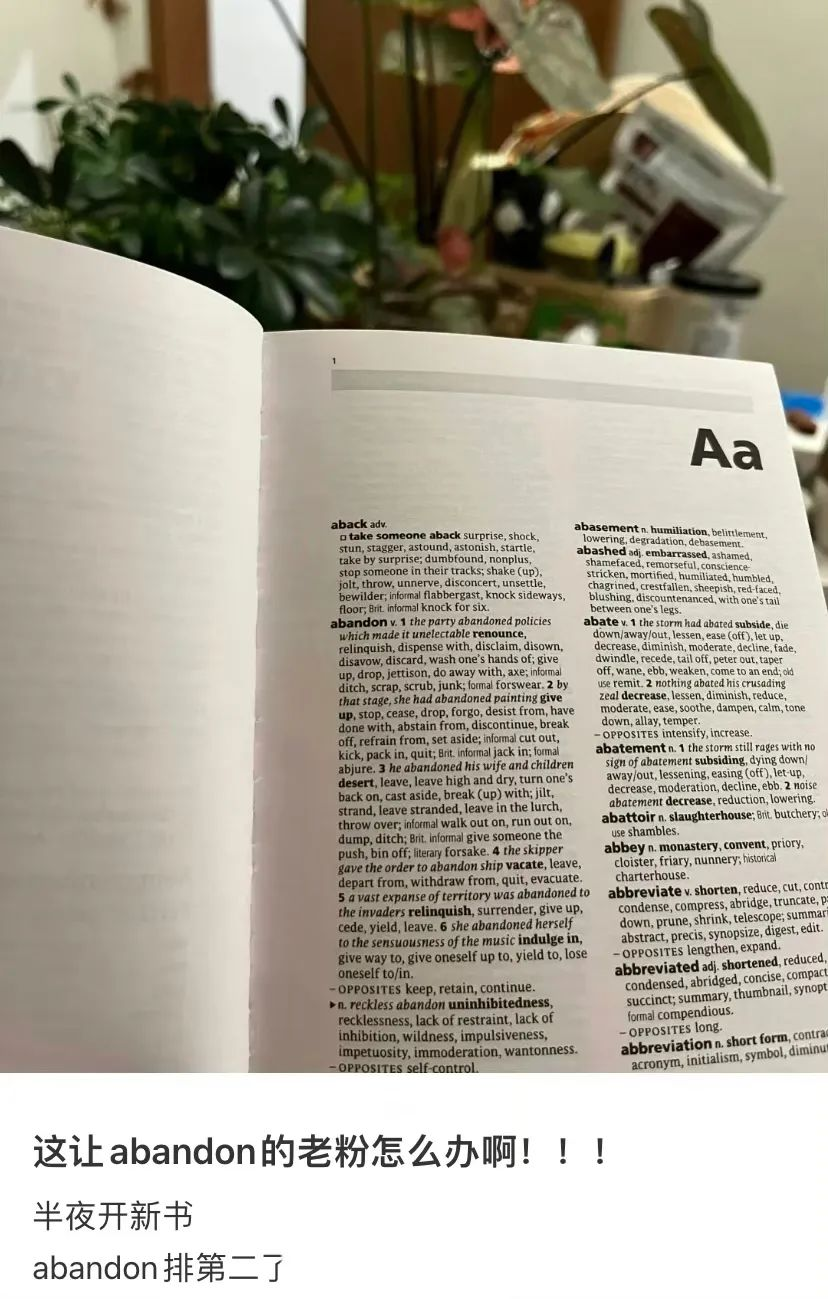近日,有网友发现“abandon”在《牛津平装本同义词库》不是第一个单词了,第一个单词变成了“aback”,不少网友直呼:“我的青春结束了!”



“aback”意为“向后;向后地”,不少网友调侃道:“一个放弃,一个后退,果然英文学习不适合我!”


为啥词典开头总是“abandon”?
世界上第一本英语词典于1604年由罗伯特·考得里(Robert Cawdrey)编撰而成,起名为“字母顺序单词表”,到今天仅存世一本。打开看到第一个单词,是“abandon”。

“abandon”解释为“放弃;中止”,于是大家纷纷自嘲:这哪里是词汇书,明明就是预言书!我懂了,叫我们一开始就学会放弃,世上无难事,只要肯“abandon”。
言归正传,词典编纂者可没有让大家放弃的想法,“abandon”排在第一位,除了延续传统,也是出于按照单词的组成字母顺序来排列的考虑。
“abandon”此词在十四世纪末期产生,其来源是拉丁语中的“ad”,意为“处于”和“bannum”,意为“宣告、命令、禁止”,组合在一起演变成法语中的“abandonner”,最后才成为我们今天看到的“abandon”。

“abandon”还有什么含义?
事实上,“abandon”并不止“放弃”那么简单,让我们一起来看看它的意思和用法吧!
01
抛弃、离弃、遗弃
Transitive verb
If you abandon a place, thing, or person, you leave the place, thing, or person permanently or for a long time, especially when you should not do so.
例句:
The 9-year-old boy was abandoned by his alcoholic father.
那个9岁的男孩被他嗜酒成性的父亲遗弃了。
02
中途放弃
Transitive verb
If you abandon an activity or piece of work, you stop doing it before it is finished.
例句:
They abandoned all hope of capturing the castle.
他们放弃了夺取这座城堡的一切希望。
03
放弃(想法或思想方式)
Transitive verb
If you abandon an idea or way of thinking, you stop having that idea or thinking in that way.
例句:
Rescuers abandoned all hope of finding any more survivors of the crash.
援救人员完全放弃了会再找到坠机生还者的希望。
04
陷入,沉湎于(某种情感)
Transitive verb
If you abandon yourself to some kind of emotion, you feel an emotion so strongly that you can feel nothing else.
例句:
He abandoned himself to despair.
他陷入绝望。
05
放纵
Uncountable noun
If you say that someone does something with abandon, you mean that they behave in a wild, uncontrolled way and do not think or care about how they should behave.
例句:
He approached life with reckless abandon—I don't think he himself knew what he was going to do next.
他以不计后果的放纵态度对待生活——我想他自己都不知道他接下来要做什么。
当词典的第一个单词不再是“abandon”,你还会有学习英语“困难症”吗?
资料来源:“中国日报双语新闻”微信公众号